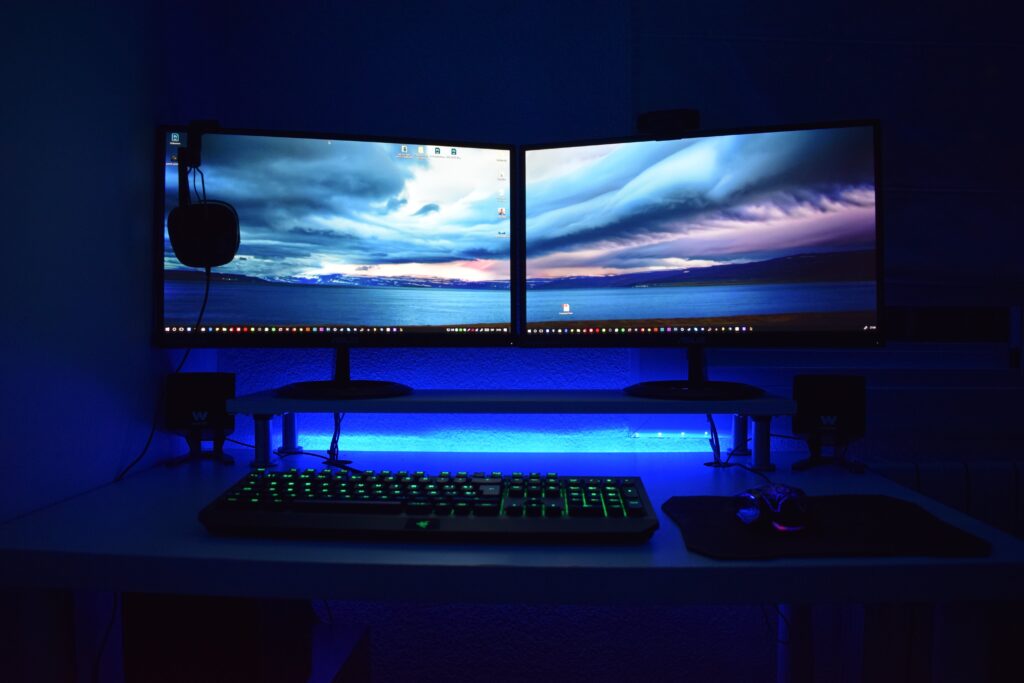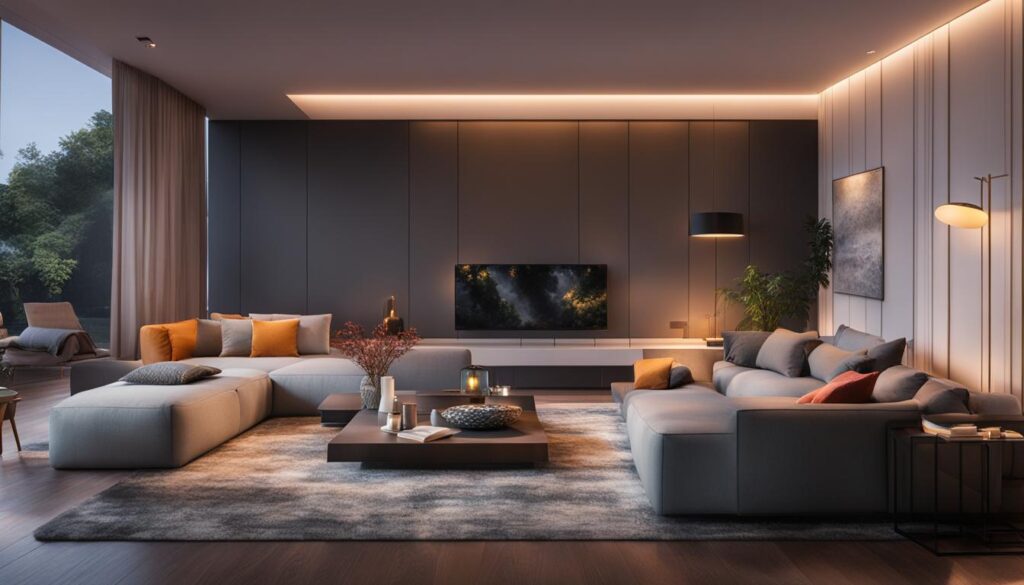Home automation has become increasingly popular in recent years, offering homeowners convenience, energy efficiency, and security. But how much does home automation actually cost? The answer depends on various factors, including the type of system and the level of automation desired. In this article, I will break down the cost of home automation and explore the factors that can influence it.
The cost of home automation can vary greatly. DIY setups can range from $250 to over $10,000, depending on the complexity of the system and the number of devices included. Brand installations, on the other hand, can start at $150 and go up to $100,000 or more, depending on the brand and the extent of the automation. Factors such as the size of the home, the specific devices and features chosen, and whether professional installation is required can all impact the overall cost.
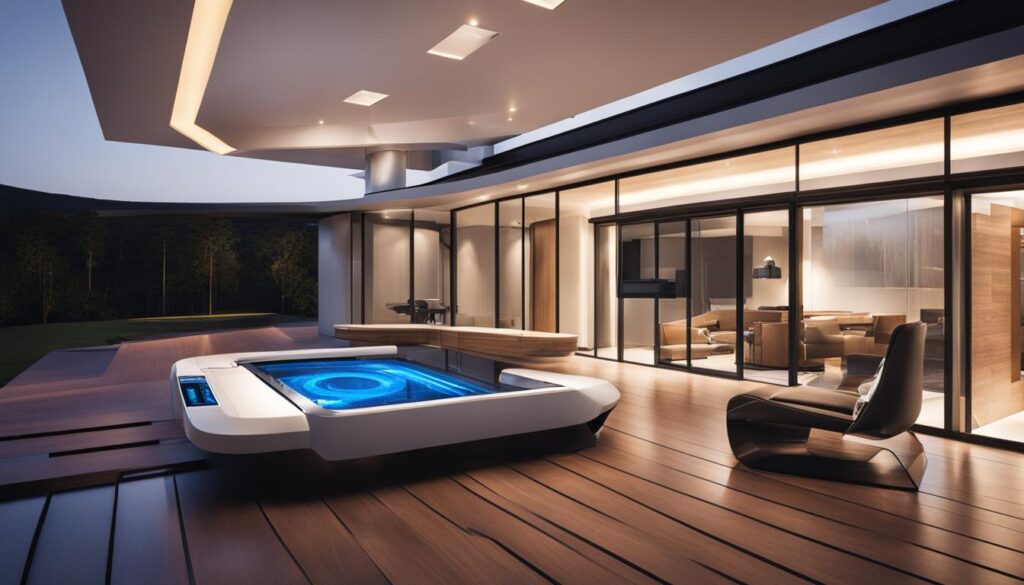
Key Takeaways:
- Home automation costs can vary from DIY setups to brand installations.
- The cost is influenced by factors such as the size of the home and specific devices chosen.
- Professional installation may be required for certain systems, adding to the overall cost.
- On average, homeowners can expect to spend between $2,000 and $6,000 for a smart home system.
- Research and compare different options to find the best fit for your needs and budget.
Factors Affecting Home Automation Costs
When considering home automation, it’s essential to understand the factors that can influence costs. By evaluating these key elements, you can estimate the expenses involved in creating your ideal smart home.
1. Home Size
The size of your home plays a significant role in determining the cost of home automation. Larger homes typically require more devices and wiring, which can increase the overall expense. Conversely, smaller homes may require a more basic system, resulting in lower costs.
2. Wiring and Protocol
The choice of wiring and protocol for your home automation system can impact both the cost and security of the installation. Wired protocols, such as Ethernet or Z-Wave, tend to be more expensive but offer enhanced reliability and security. Wireless protocols, like Wi-Fi or Bluetooth, are generally more affordable but may have potential security risks. It’s important to consider your specific needs and budget when selecting the wiring and protocol for your smart home.
3. Devices and Features Desired
The specific devices and features you desire can greatly affect the cost of home automation. High-end devices with advanced features or specialized functionalities may come with a higher price tag. Additionally, integrating various systems like security, lighting, heating, and entertainment can contribute to the overall cost. It’s essential to prioritize your automation goals and budget accordingly to ensure an optimal balance between functionality and affordability.
4. Professional Installation Factors
While DIY installation is an option for some homeowners, professional installation can provide a hassle-free experience and ensure all components are properly integrated. The cost of professional installation will impact the overall expense of home automation installation. Some brands offer installation services as part of their packages, while others may require hiring a separate installer. Remember to factor in installation costs when estimating your budget.
5. Smart Home Maintenance and Upgrades
Keep in mind that ongoing maintenance and potential system upgrades should also be considered when calculating the long-term cost of home automation. Regular maintenance and updates may be necessary to ensure the system continues to function optimally and remains compatible with new technologies. It’s important to allocate funds for these future expenses to maintain a seamless smart home experience.
By taking into account these factors, you can make informed decisions and estimate the costs involved in implementing home automation in your house. Remember to thoroughly research different systems, consult professionals, and assess your needs to create a smart home that aligns with your budget and preferences.
Types of Smart Home Systems and Costs
When it comes to smart home systems, there are various options available, each with its own set of features and costs. From enhancing home security to automating household tasks, smart home systems offer convenience, efficiency, and peace of mind. Let’s explore some of the popular types of smart home systems and their associated costs:
1. Home Security Systems
Cost Range: $500 – $5,000
Home security systems are designed to protect your home from intruders, fire, and other emergencies. These systems typically include features such as surveillance cameras, door and window sensors, motion detectors, and alarms. The cost of home security systems can vary depending on the size of your home and the level of security you require.
2. Home Lighting Systems
Cost Range: $1,000 – $5,000
Automating your home lighting can provide convenience and energy efficiency. Smart lighting systems allow you to control the lights in your home remotely, set schedules, and adjust brightness and color. The cost of home lighting systems depends on the number of lights, type of bulbs, and the level of automation you desire.
3. Heating and Cooling Systems
Cost Range: $800 – $3,000
Smart heating and cooling systems, also known as smart thermostats, enable you to control the temperature of your home remotely and create customized schedules. These systems can help you save energy and optimize comfort. The cost of smart heating and cooling systems varies based on the brand, model, and compatibility with your existing HVAC system.
4. Smart Entertainment Systems
Cost Range: $2,000 – $4,000
Upgrade your home entertainment experience with smart entertainment systems. These systems integrate your audio and video devices, allowing you to control them from a single interface. You can stream music, movies, and TV shows, and even create immersive home theater setups. The cost of smart entertainment systems depends on the complexity of the setup and the brands you choose.
5. Automated Lawn and Garden Systems
Cost Range: $500 – $2,000+
Keep your lawn and garden looking beautiful with automated systems. Smart sprinklers, robotic lawn mowers, and garden sensors can take care of watering, mowing, and monitoring plant health. The cost of automated lawn and garden systems depends on the size of your outdoor space and the specific devices you need.
6. Smart Kitchen Systems
Cost Range: $25,000+
Transform your kitchen into a smart and efficient space. Smart kitchen systems include connected appliances, such as refrigerators, ovens, dishwashers, and coffee makers. These appliances can be controlled remotely, provide recipe recommendations, and even track food inventory. The cost of smart kitchen systems can vary widely depending on the brands and features you choose.
7. Miscellaneous Smart Devices
Cost Range: Varies
In addition to the major smart home systems, there are various miscellaneous smart devices available to enhance your home automation experience. These include smart garage doors, outlets, smoke detectors, door locks, and more. The cost of these devices depends on the specific product and brand.
It’s important to note that the cost ranges provided are approximate and can vary based on factors such as brand, features, installation requirements, and any additional services. To determine the exact cost of implementing a smart home system, it’s recommended to consult with a reputable smart home provider or installer.
By investing in smart home systems, you can enjoy the benefits of an interconnected and efficient home environment. The convenience, energy savings, and enhanced security offered by these systems make them a worthwhile investment for many homeowners.
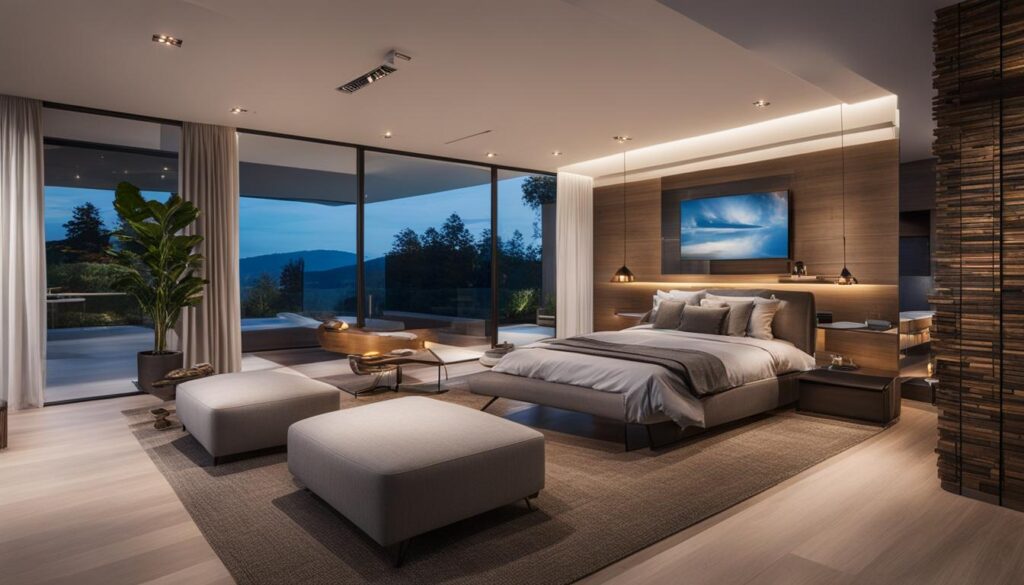
In the upcoming section, we will explore some of the popular smart home brands available in the market and their unique offerings. Stay tuned for more information on choosing the right smart home system for your needs.
Popular Smart Home Brands
When it comes to smart home automation, there is no shortage of options in the market. Various reputable brands offer a wide range of products and services to cater to different needs and preferences. Below, I have compiled a list of popular smart home brands that homeowners can consider:
- Google Nest: Known for its innovative devices, Google Nest offers a comprehensive range of smart home solutions, including thermostats, security cameras, and smart speakers.
- Ring: Ring specializes in home security and offers a range of video doorbells, security cameras, and smart lighting options to enhance the safety of your home.
- Amazon Alexa: With its Alexa-powered devices, Amazon provides an ecosystem for controlling and automating various aspects of your home, from lights and entertainment to thermostats and security.
- Blink: Blink offers affordable yet reliable security cameras and video doorbells, allowing homeowners to keep an eye on their property remotely.
- SimpliSafe: SimpliSafe focuses on home security systems, offering easy-to-install devices that include security cameras, motion sensors, and door/window sensors.
- ADT: ADT is a well-established brand in the home security industry, providing a range of security and monitoring solutions, including alarms, surveillance cameras, and 24/7 professional monitoring services.
- Vivint: Vivint offers comprehensive smart home solutions, including security systems, home automation, and energy management, enabling homeowners to control and monitor their homes remotely.
- Savant: Savant specializes in high-end home automation solutions, offering advanced control systems for lighting, audio, video, climate, and security.
- Elan: Elan provides integrated home automation and control solutions, allowing homeowners to manage various aspects of their homes, such as lighting, entertainment, security, and more, through a centralized platform.
These popular smart home brands have established themselves as leaders in the industry, offering reliable products and services that are known for their quality and performance. Whether you are looking to enhance the security of your home, automate your lighting and appliances, or create a fully integrated smart home experience, these brands have the solutions you need.
A Comprehensive Comparison of Popular Smart Home Brands
| Brand | Product Range | Key Features | Price Range |
|---|---|---|---|
| Google Nest | Thermostats, security cameras, smart speakers | Intelligent learning, voice control | $100 – $500 |
| Ring | Video doorbells, security cameras, smart lighting | Two-way communication, motion detection | $100 – $500 |
| Amazon Alexa | Smart speakers, smart displays, smart plugs | Voice control, integration with various smart home devices | $30 – $300 |
| Blink | Security cameras, video doorbells | Wireless, battery-powered, motion detection | $80 – $250 |
| SimpliSafe | Security systems, cameras, sensors | Easy installation, professional monitoring | $200 – $600 |
| ADT | Security systems, surveillance cameras, monitoring services | 24/7 professional monitoring, alarm systems | $400 – $1,500+ |
| Vivint | Security systems, home automation, energy management | Smart locks, doorbell cameras, mobile app control | $500 – $5,000+ |
| Savant | Lighting control, audio/video control, security | Customizable scenes, voice control integration | $2,000 – $10,000+ |
| Elan | Home automation, lighting control, security | Centralized control interface, integration with third-party devices | $2,500 – $15,000+ |
Installation Costs and Options
When considering smart home installation, it’s important to factor in the costs and options available to you. Let’s explore the different aspects you need to consider.
DIY vs Professional Installation
One of the first decisions to make is whether you want to tackle the installation yourself or hire a professional. DIY installation can be a cost-effective option, as it eliminates the need to pay for labor. However, it does require technical knowledge and can be time-consuming.
On the other hand, professional installation ensures that the system is set up correctly and all devices are integrated seamlessly. While it may come at a higher cost, it offers peace of mind and saves you the hassle of figuring out the technicalities yourself.
Keep in mind that some brands provide installation services as part of their packages, while others may require you to hire a separate installer.
Smart Home Installation Costs
The costs associated with smart home installation can vary depending on factors such as the size of your home, the complexity of the system, and the specific devices you choose. Below, I’ve outlined a breakdown of typical costs for different installation options:
| Installation Option | Cost Range |
|---|---|
| DIY Installation | Varies depending on the system complexity and number of devices |
| Professional Installation | $500 – $2,500+ |
| Brand Installation Services | May be included with the purchase of a package or require an additional fee |
Please note that the above costs are just estimates and can vary depending on your specific requirements and the market conditions in your area.
Before making a decision, it’s essential to consider your skills, time availability, and budget. If you’re confident in your DIY abilities and have the time to devote to the installation process, it can be a cost-effective option. However, if you prefer a hassle-free installation or lack the technical know-how, hiring a professional may be the best way to go.
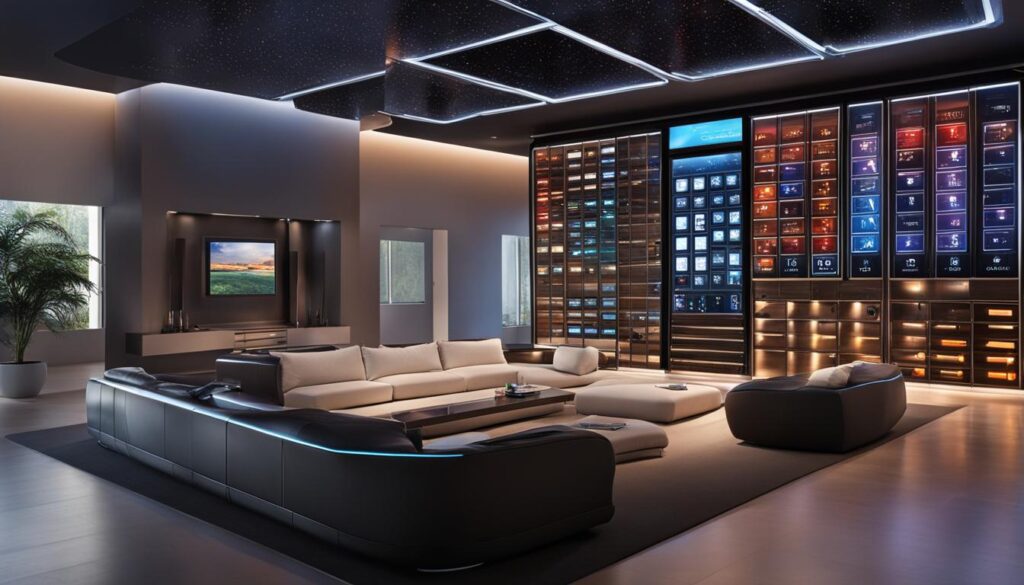
Summary
The cost of home automation varies based on different factors such as the type of system, the size of the home, the specific devices selected, and the chosen installation method. On average, homeowners can expect to spend between $2,000 and $6,000 for a smart home system.
However, it’s important to note that these costs can significantly vary depending on individual preferences and the desired level of automation. DIY setups can be more affordable, starting at around $250, but may require technical knowledge and time investment. On the other hand, professional installations can start at around $150 but can exceed $100,000 depending on the complexity of the system and customization.
When considering home automation, it is crucial to research and compare different options to find the best fit for your needs and budget. Take into account factors such as the size of your home, the specific devices and features you require, and whether you prefer a DIY or professional installation. By carefully assessing these factors, you can make an informed decision and create a smart home that meets your automation needs without breaking the bank.
FAQ
How much does home automation cost?
The cost of home automation can vary depending on factors such as the system type and the level of automation desired. DIY setups can range from $250 to over $10,000, while brand installations can start at $150 and go up to $100,000 or more.
What factors affect home automation costs?
The cost of home automation is influenced by factors such as the size of the home, the specific devices and features chosen, and whether professional installation is required. The choice of wiring and protocol can also impact the cost.
What are the types of smart home systems and their costs?
There are various types of smart home systems, each with its own associated costs. Home security systems can range from $500 to over $5,000, fully automated home lighting can cost $1,000 to $5,000, and smart heating and cooling systems typically range from $800 to $3,000. Smart entertainment systems can cost between $2,000 and $4,000, automated lawn and garden systems range from $500 to $2,000 or more, and smart kitchens can cost over $25,000. Additionally, there are various miscellaneous smart devices available, such as garage doors, outlets, smoke detectors, and more, which have their own price ranges.
What are some popular smart home brands?
Some popular smart home brands include Google Nest, Ring, Amazon Alexa, Blink, SimpliSafe, ADT, Vivint, Savant, and Elan. These brands offer different packages, features, and options for home automation.
What are the installation costs and options for smart home systems?
Smart home installation costs can vary depending on whether the homeowner chooses to install the system themselves or hire a professional. DIY installation can save money but requires technical knowledge and time. Professional installation is typically more expensive but ensures proper setup and integration of all devices. Some brands offer installation services as part of their packages, while others may require hiring a separate installer.
What is the average cost of home automation?
The cost of home automation depends on various factors, but on average, homeowners can expect to spend between $2,000 and $6,000 for a smart home system. However, costs can vary greatly depending on individual preferences and the level of automation desired.

